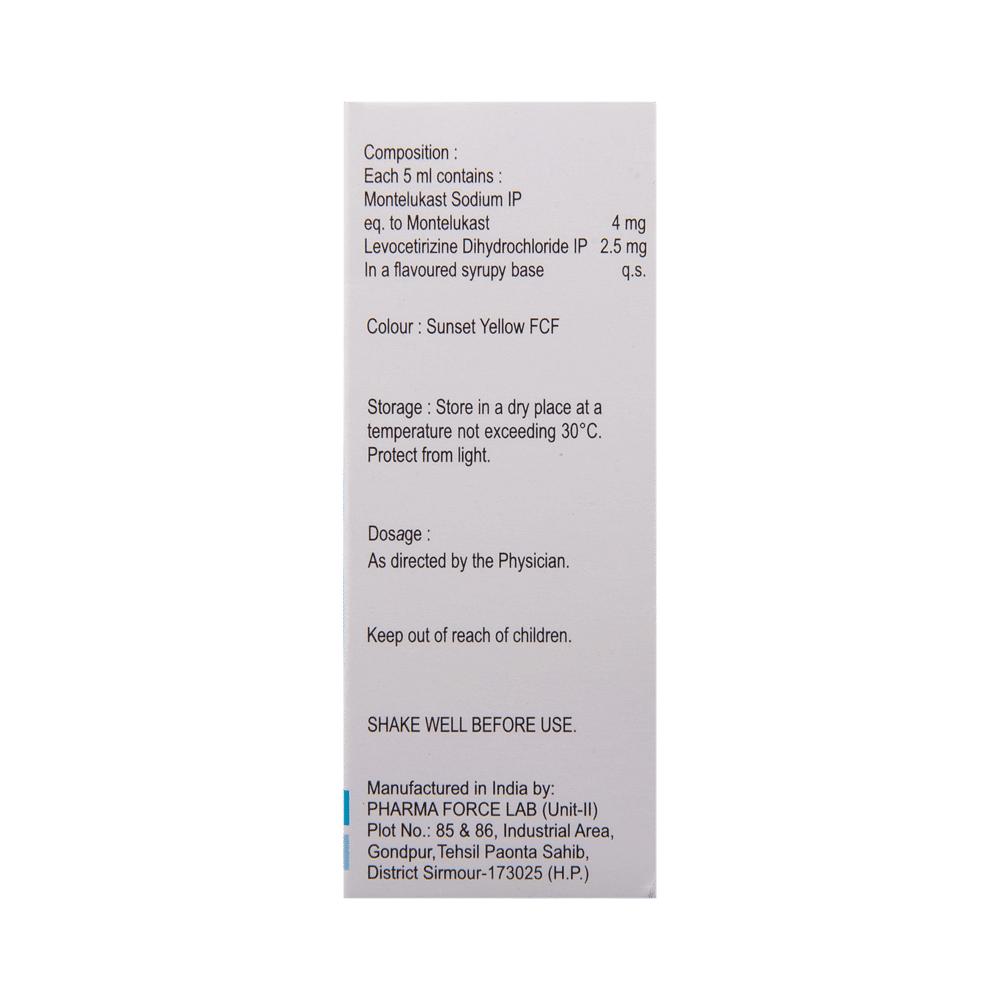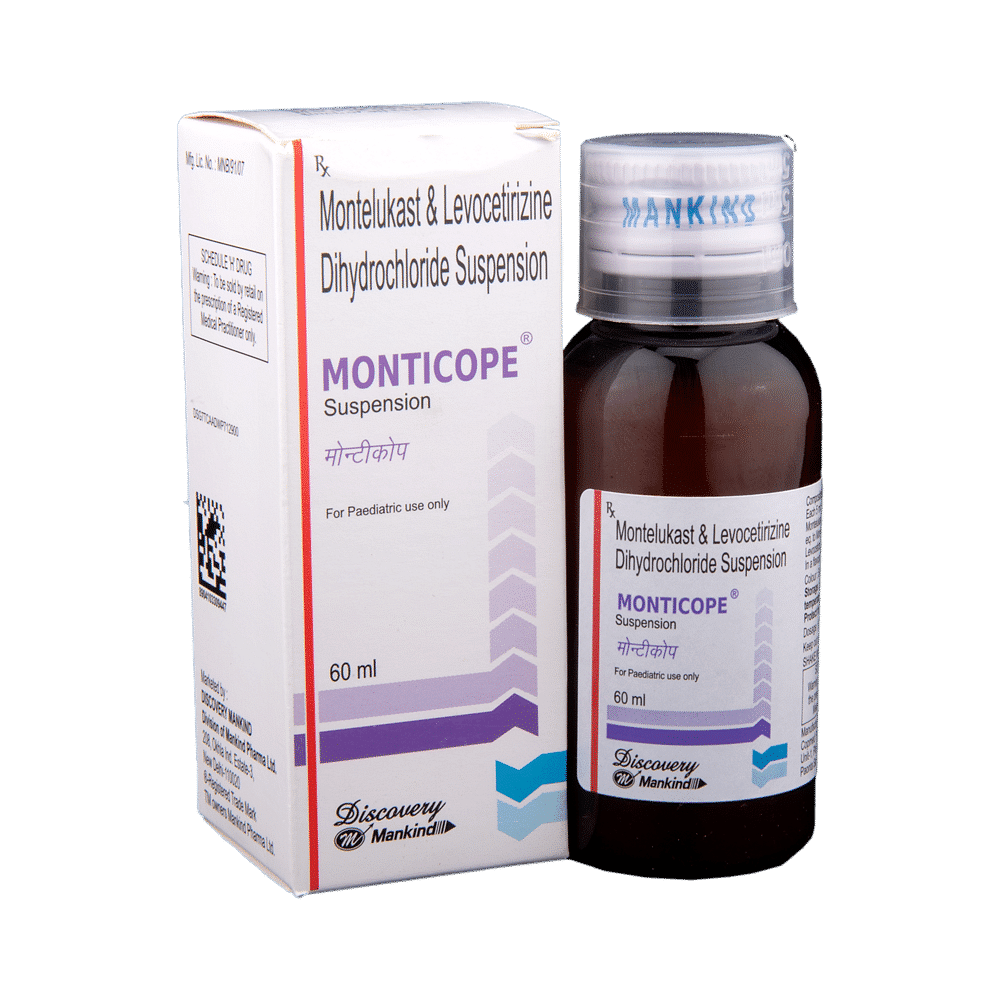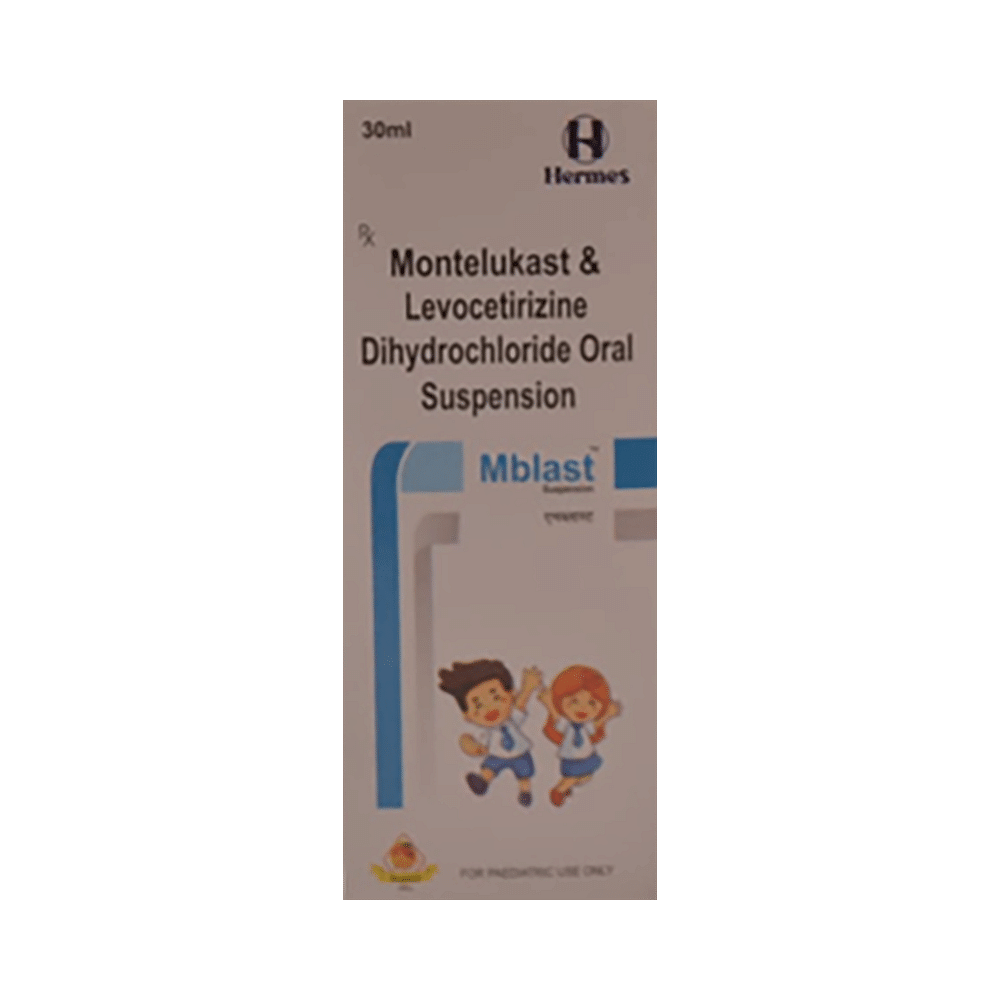
Zinagon M Oral Suspension
Manufacturer
Semiotic Pharmaceutical Private Limited
Salt Composition
Levocetirizine (2.5mg/5ml) + Montelukast (4mg/5ml)
Key Information
Short Description
Zinagon M Oral Suspension is a medication used to treat symptoms of allergy, asthma, and skin allergies in children.
Dosage Form
Oral Suspension
Introduction
Zinagon M Oral Suspension is commonly prescribed in children to treat symptoms of allergy such as runny nose, sneezing, itching, swelling, congestion, and watery eyes. It may also help in the treatment of asthma and skin allergies.
Directions for Use
Zinagon M Oral Suspension is given orally to children. It is important to follow the dosage instructions provided by the doctor.
Safety Information
Side Effects
No common side effects listed
How it works
Zinagon M Oral Suspension contains Levocetirizine and Montelukast. Together these two relieve sneezing and runny nose caused due to allergies. Levocetirizine is an antiallergic that blocks a chemical messenger (histamine) responsible for runny nose, watery eyes, and sneezing. Montelukast is a leukotriene antagonist. It works by blocking another chemical messenger (leukotriene). This reduces inflammation (swelling) in the airways and nose and improves symptoms.
Quick Tips
Never combine Zinagon M Oral Suspension with other cold and flu medicines as that may have side effects. Zinagon M Oral Suspension helps prevent asthma attacks. Never use it to stop an attack that has already started as it will not help. If you are giving Zinagon M Oral Suspension to your child for asthma or allergy you need not give another dose to prevent exercise-induced breathing problems. In case of any confusion consult your child’s doctor as soon as possible. Make sure that you always have enough medicine. Practice self-care tips: Abstain your child from coming in contact with allergens, Encourage your child to wear a face mask and avoid dusty places, Give plenty of fluids as it helps in thinning and loosening the mucus in the lungs.
Related Medicines

Monticope Suspension

Monticope Suspension

Xyzal M Suspension

Kcet-M Oral Suspension

Uzin M Oral Suspension

Acolate M Kid Oral Suspension

Mblast Oral Suspension

Lcave M Oral Suspension

Montex L Oral Suspension

Alvocet M Oral Suspension
Frequently asked questions
Can I give cough and allergy medicine together if my child has a persistent cough along with allergic symptoms?
No, it's not recommended to mix cough and allergy medicines. This can lead to double dosing of active ingredients, causing serious side effects. Instead, consult with your child's doctor for personalized advice on managing their symptoms.
Can I decrease the dose of Zinagon M Oral Suspension if my child starts to feel better?
No, it's essential to follow the prescribed dose as directed by your child's doctor. Changing the dose without medical guidance can impact your child's health. Consult with your child's doctor before making any changes to their medication regimen.
How should Zinagon M Oral Suspension be stored?
Store Zinagon M Oral Suspension at room temperature in a dry place, away from direct heat and light. Keep all medicines out of the reach and sight of children to avoid accidental intake.
Can Zinagon M Oral Suspension make my child sleepy?
Yes, Zinagon M Oral Suspension can cause mild drowsiness, which may make your child sleepy. However, never use this medicine to induce sleep, as it may mask underlying sleep disorders like insomnia. Consult with your child's doctor if you have concerns about their sleep.
Can I start the course of Zinagon M Oral Suspension if my child has a sports event in the next two days?
No, it's essential to consult with your child's doctor before starting Zinagon M Oral Suspension, especially if they have an upcoming sports event. The medicine may cause mild sedation, dizziness, and sleepiness, which could impact their performance. Your child's doctor can provide personalized guidance on managing their symptoms while still allowing them to participate in their event.
Can I stop the medicine by myself?
No, it's not recommended to stop Zinagon M Oral Suspension without consulting your child's doctor. Sudden withdrawal of the medicine can cause symptoms to reappear. Instead, work with your child's doctor to gradually taper off the medication to minimize the risk of rebound symptoms.
Is it safe to give Zinagon M Oral Suspension to my child if they have a mood disorder?
Consult your child's doctor before giving Zinagon M Oral Suspension to your child, especially if they have a history of mood disorders. Some studies suggest that the medicine may cause mood disorders, hallucinations, depression, anxiety, suicidal thoughts, shakiness, and trouble controlling body movements. Your child's doctor can help you weigh the benefits and risks of the medication and provide personalized guidance on managing their symptoms.
Can I use Zinagon M Oral Suspension to treat acute asthma attacks in my child?
No, Zinagon M Oral Suspension is only intended to prevent asthma attacks, not to stop an attack that has already started. Use your child's reliever medicine to help manage an acute asthma attack. Consult with your child's doctor for personalized guidance on managing their asthma symptoms.


